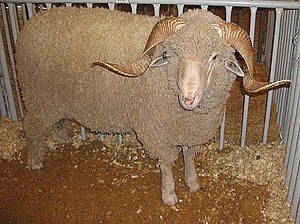|
|
| Line 1: |
Line 1: |
| − | [[Image:Rambouillet.jpg|thumb|250px|Rambouillet ram.]]
| + | {{Breed id |
| − | The '''Rambouillet''' is also known as the Rambouillet [[Merino]] or the French Merino. The development of the Rambouillet breed started in 1786 when the French government either purchased or [[Louis XVI of France|Louis XVI]] received a gift of over three hundred Spanish Merinos (318 ewes, 41 rams, 7 wethers) from Lousi XVI cousin, the King of Spain. The flock was subsequently developed on an experimental royal farm at a place known as [[Rambouillet]], not far from Paris. The flock was cultivated by the government with no sheep being sold for many years. | + | |name = Rambouillet |
| − | | + | |image = Rambouillet.jpg |
| − | Outcrossing with English long-wool breeds and selection, produced a well-defined breed <ref>{{cite book
| + | |description = |
| − | | last = Paterson
| + | The '''Rambouillet''' is also known as the Rambouillet Merino or the French Merino. |
| − | | first = Mark
| |
| − | | title = National Merino Review
| |
| − | | publisher = Farmgate Press
| |
| − | | date = 1990
| |
| − | | location = West Perth, Australia
| |
| − | | pages = 12-17
| |
| − | | id = ISSN 1033-5811 }}</ref>, differing in several important points from the original Spanish merino. The size was greater with full grown ewes weighing up to two hundred [[pound (mass)|pounds]] and rams up to three hundred pounds, live weight. The wool clips were larger and the wool length had increased to greater than three [[inch]]es.
| |
| − | | |
| − | In 1889 the Rambouillet Association was formed in the [[United States]] with the aim of preserving the breed. It has been estimated that 50% of the sheep on the US western ranges are of Rambouillet blood
| |
| − | <ref> {{cite book
| |
| − | | last = Ross
| |
| − | | first = C.V.
| |
| − | | title = Sheep production and Management
| |
| − | | publisher = Prentice Hall
| |
| − | | date = 1989
| |
| − | | location = Engleworrd Cliffs, New Jersey
| |
| − | | pages = 26-27
| |
| − | | id = ISBN 0-13-808510-2 }} </ref>.
| |
| − | Rambouillet stud has also had an enormous influence on the development of the Australian Merino industry though [[Emperor Sheep|Emperor]] and the [[Peppin Merino]] stud.
| |
| − | | |
| | The fleece was valuable in the manufacture of cloth, at times being woven in a mixed fabric of cotton [[warp]] and wool [[weft]], known as [[delaine]]s. | | The fleece was valuable in the manufacture of cloth, at times being woven in a mixed fabric of cotton [[warp]] and wool [[weft]], known as [[delaine]]s. |
| | | | |
| − | The breed is well known for its [[wool]], but also for its meat, both [[lamb]] and [[mutton]]. It has been described as a dual-purpose breed, with superior wool and near-mutton breed characteristics. | + | The breed is well known for its wool, but also for its meat, both lamb and mutton. It has been described as a dual-purpose breed, with superior wool and near-mutton breed characteristics. |
| − | | + | }} |
| − | == References ==
| |
| − | {{Reflist}}
| |
| − | {{refbegin}}
| |
| − | * [http://rambouilletsheep.org/index.php?page=history The American Rambouillet Sheep Breeders Association]
| |
| − | * [http://www.tumbledownfarm.com/texts/DS/DS_II.html "The Varieties and Breeds of Sheep"] in Henry Stewart's ''The Domestic Sheep: Its Culture and General Management''. Chicago: American Sheep Breeder Press, 1898.
| |
| − | {{refend}}
| |
| − | | |
| − | {{sheep-stub}}
| |
| − | [[Category:Sheep]]
| |
| − | | |
| − | [[da:Rambouillet-får]]
| |
| − | [[fr:Mérinos de Rambouillet]]
| |
| − | [[sv:Rambouillet (fårras)]]
| |

